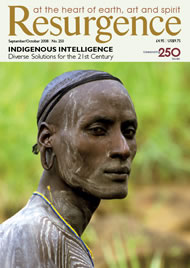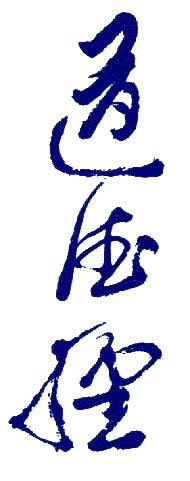OF ALL THE founding texts of Chinese religion and philosophy, the Tao Te Ching is the one that reads most like pure poetry. Unlike the Analects of Confucius, which seem to offer sensible though undogmatic advice on matters of living and ruling, the Tao Te Ching speaks about Being.
The Tao Te Ching hovers on the edge of unspeakability. It constantly refers to mystery, often in a mysterious way. The first of the eighty-one short chapters ends as follows: “The Mystery of mysteries is the Door of all Essence.” That seems to insist on the mysteriousness of mystery, and we might remember that our word ‘mystery’ comes from the Greek muo, ‘to keep silent’. The same chapter begins “Tao can be talked about, but not the Eternal Tao.”
You might wonder about the usefulness of a set of teachings which constantly argue that their essence cannot be talked about, but the Tao Te Ching has had an immense influence, on Taoist philosophy and religion, and on Chinese literature and, especially, art. Not only that, but as the Catholic monk Thomas Merton said in the introduction to his translation of the other Taoist classic, Chuang Tzu, “some of the wisdom of the Tao Te Ching…is absolutely necessary for us not only to progress but even to survive.”
How can it be that this mysterious text, attributed to a legendary figure called Lao Tzu (which means ‘Old Master’) and certainly more than 2,000 years old, can be so necessary now? Confucius, as Arthur Hummel has written, “places a man in his proper relation to his fellow-men, [the Tao Te Ching] in proper relation with Nature.” The Tao Te Ching is an ecological text, but in a subtle and oblique way. Its central message is that Nature has its own way (Tao means ‘way’); a good symbol for it is water, “which knows how to benefit all things without striving with them”. Short-sighted human interference with this way is likely to lead to disaster.
Time and again the Tao Te Ching stresses the preferability of Non-Doing (wu wei) to Doing. “The practice of Tao consists in daily diminishing,” says Chapter 48. “Keep on diminishing and diminishing, | Until you reach the state of Non-Ado.” Long before it became something of a cliché with theatre practitioners, ‘less is more’ lay at the heart of Taoist philosophy. But wu wei does not mean literally ‘do nothing’ so much as ‘go with the flow’, or ‘act spontaneously’. By this kind of ‘doing nothing’, as Lao Tzu says in a characteristic paradox, one can accomplish everything.
What is the relevance of the Tao Te Ching in a world, and especially a China, where everything seems guided by the quite contrary principles of Western rationalism and the attempt to control Nature? Certainly nothing could be less in the spirit of the Tao than the Three Gorges Dam Project, one of the most massive and brutal interventions in Nature ever conceived, which has displaced millions of people, destroyed ancient cities and obliterated landscapes which inspired some of the greatest Chinese poetry.
But assimilating the Tao Te Ching to Western environmentalism is fraught with dangers. Any strain of green thinking which violently rejects all forms of civilisation is not in keeping with the gentle philosophy of Lao Tzu. The Tao Te Ching does not violently reject anything. One of the most beautiful pairs of lines goes as follows: “When the world is in possession of the Tao, | The galloping horses are led to fertilise the fields with their droppings.” This is an image of peace (the horses are not war horses), plenty (the fields are fertilised) and harmony.
In fact, the most salient characteristic of the Tao Te Ching is its subtlety. In Chapter 15, Lao Tzu writes, “The ancient adepts of the Tao were subtle and flexible, profound and comprehensive.” This subtlety operates at the level of language and thought as well as action. The Tao Te Ching is a profoundly challenging text for post-Enlightenment rationalists, because it suggests that the kind of talk about principles, justice and equality which characterises our age is a distraction or an aberration. “Drop humanity, abandon justice,” says Lao Tzu in Chapter 19, “and the people will return to their natural affections.” This might seem shocking, but when one considers the genocides and campaigns of ethnic cleansing which have occurred just in the last two decades, in Bosnia, Rwanda and Darfur, while organisations devoted to humanity and justice could only stand by and watch, then Lao Tzu’s words give food for thought.








